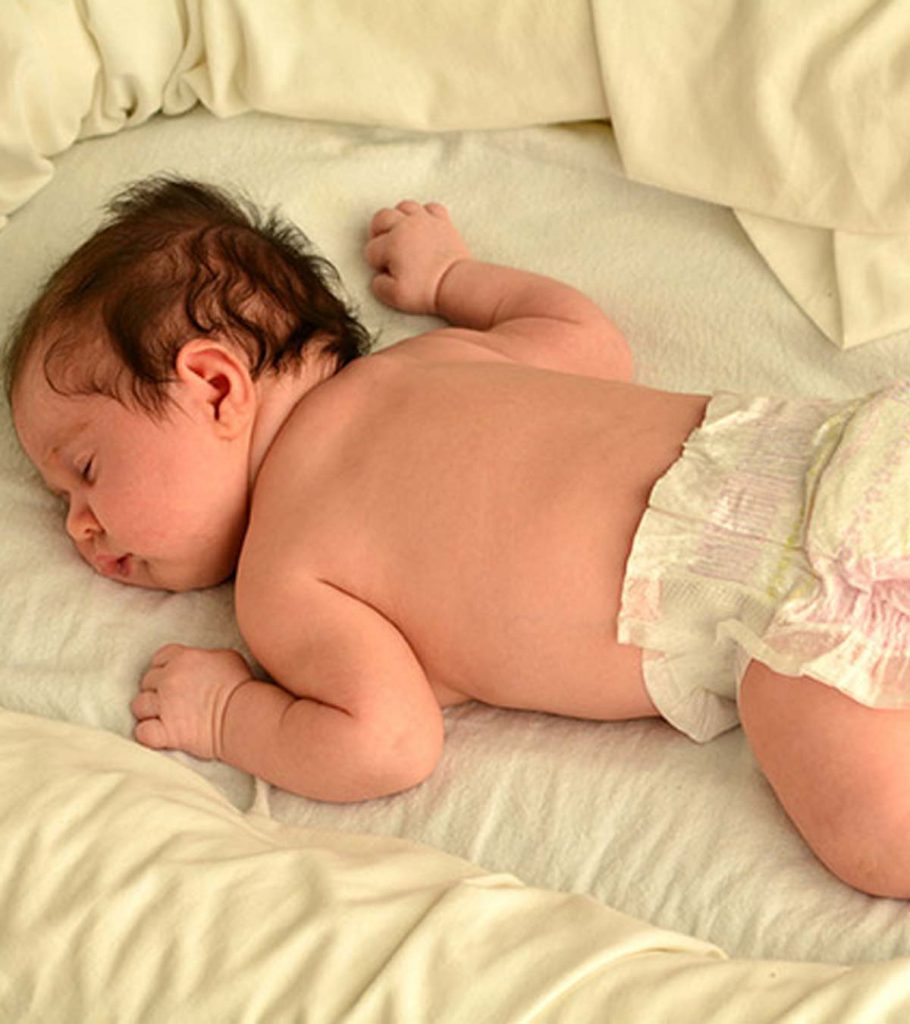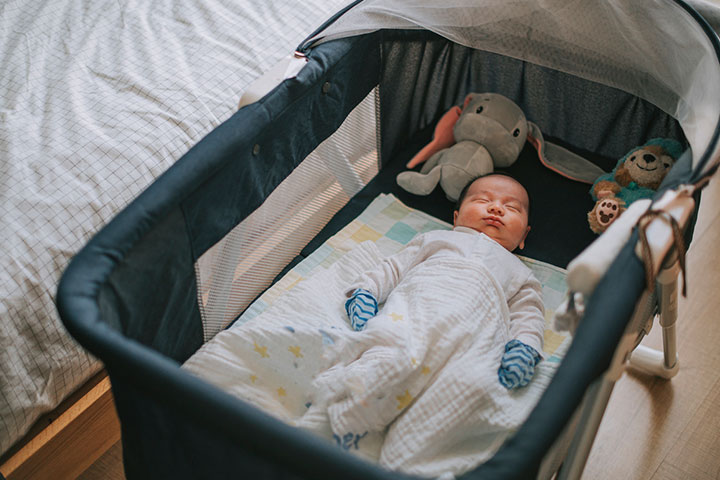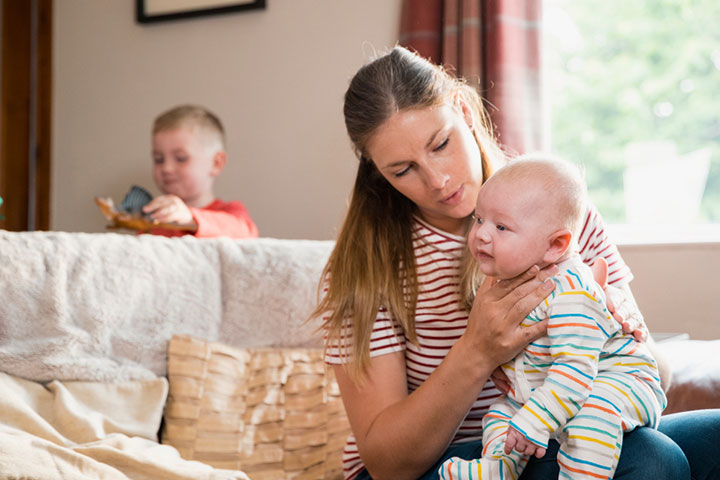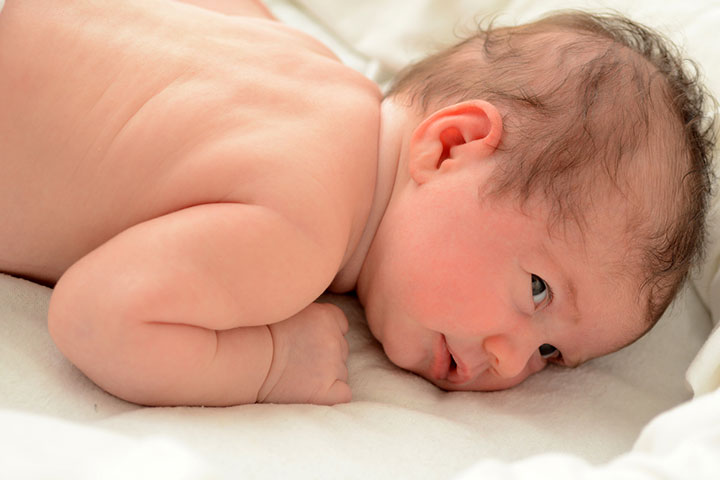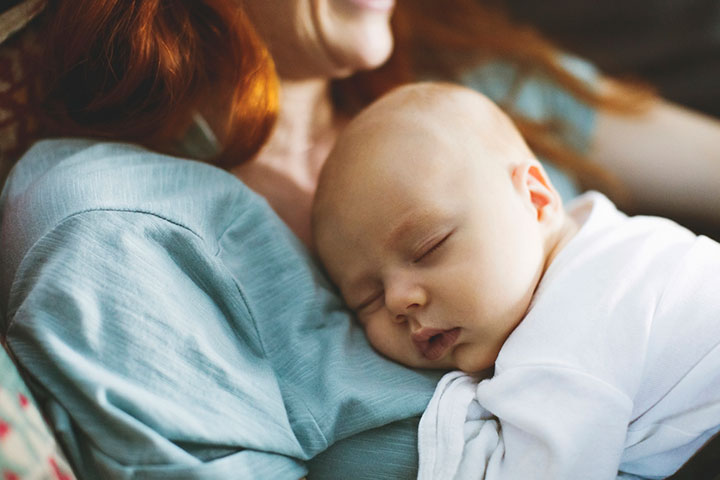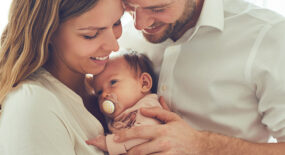Parents often think about the best sleeping positions for their baby to sleep safely and peacefully. A baby sleeping on the stomach is a common phenomenon, but it may be one sleep position to avoid as it could sometimes lead to breathing difficulties in babies. Furthermore, the sleeping-on-the-belly position is likely to pose a few other risks to a baby. Read on as we present critical information about babies sleeping on their bellies.
Can Babies Sleep On Their Stomach?
Doctors suggest parents not to make their babies sleep on their stomach until 12 months of age. It is also not the correct way to position a baby in a crib during naps. Pediatric experts recommend making the baby sleep on the back (1). You may ask your doctor before making the baby lie on his sides. Tummy sleeping is quite normal for adults but is not advisable for babies due to potential risks.
In a PRAMS survey conducted in 2022, an overwhelming majority of healthcare workers recommended placing a baby on their back while sleeping. Since 2016, consistently, more than 95% of healthcare workers have been recommending the back-to-sleep position for babies. The survey also noted, on its sidelines, that 90% of parents received advice from healthcare workers about placing the baby on the back for sleep. It shows that sleeping on the back is widely acknowledged as the safest sleep position for infants.
Healthcare worker recommendations for safe sleep practices in infants
Source: Safe Sleep Behaviors and Advice; NH Division of Public Health Services/PRAMS
What To Do If The Baby Likes To Sleep On Stomach?
Train the infant to sleep on his back. However, some infants may find comfort in sleeping on their tummy rather than the back. If that is the case, put the baby on his back whenever he sleeps on his stomach. The baby will certainly be fussy and wake up abruptly during your initial efforts. However, continue to do that until the baby is conditioned to sleep on his back (2). Pediatric experts state that while the infant may find it uncomfortable at the beginning, most get used to it quite quickly.
What Could be The Risks Associated With A Baby Sleeping On The Belly?
A baby could face the below risks:
- Low oxygen intake:When a baby sleeps on his belly, his face is bound to stay close to the mattress and bedding , which can cause poor air circulation around his nose. It means he breathes in the exhaled air that is rich in carbon dioxide. It could reduce the amount of oxygen reaching the baby’s lungs, and cells of the body, which can cause problems in cellular metabolismiXChemical changes occurring in the cells, which are responsible for energy production and proper body functioning.
- Obstructed breathing due to posseting: Posseting happens when the baby regurgitates some semi-digested food from the stomach usually along with a burp. When a baby sleeps on his stomach, the posseted food from the esophagus can go downwards due to gravity, and obstruct the trachea (3). It can lead to restricted breathing and even suffocation. For this reason, babies with reflux need to especially sleep on their backs and not tummies to mitigate the risk of obstructed breathing (4). Burping them after feeds can also help reduce the incidence of spitting up.
- Excess heat: A baby’s body is sensitive to thermal regulationiXAbility of an organism to maintain an optimal body temperature regardless of the outside temperature. Infants also have more surface area of skin in proportion to their body weight. It means they generate and lose about four times the body heat when compared to adults (5). Stomach sleeping has been shown to interfere with effective body heat dissipation among infants (6). This leads to an increase in the baby’s body temperature, especially during the summers. This excess heat can lead to fever and dehydration.
- Interference with some body functions: Some studies have noted that babies who sleep on their bellies experience a sudden decrease in blood pressure (7). Belly-sleeping infants are also less reactive to sounds, have restricted body movement, and take longer to wake up (8). These factors have been shown to increase the chances of sudden death in infants.
- Sudden infant death syndromeiXUnexpected and sudden demise of an infant below 12 months, mostly during sleep (SIDS):The above risks of belly sleeping together contribute to an increased possibility of SIDS. The death may be due to no apparent reasons, and may occur even in a healthy infant. According to the National Vital Statistics System by CDC and NCHS, about 1,062 cases of unexpected infant deaths occur due to unknown reasons while 905 cases report unexpected strangulation and suffocation in bed as the cause. The `US National Institute of Health (NIH), states that sleeping on the belly is one of the contributing factors to SIDS (9).
Sleeping on the back is thus safe for a baby as it presents no risks. However, he may not always have to sleep that way.
When Can Babies Sleep On Their Stomach?
You may leave the baby to sleep on his belly when he can roll to the belly by himself, which usually happens around six months (10). But, while putting the baby in bed to sleep, put him on his back and stop swaddling. When he is capable of rolling, he can handle stomach sleeping better with a lower risk of SIDS, as he can roll and lie on his back again.
You could check on your baby and see how he is sleeping, especially during the nights.
Should You Place A Baby On His Back If He Rolls To Stomach?
You don’t have to place a baby on his back. A newborn and a baby younger than six months are not likely to roll themselves from back to belly during sleep. It means, if placed on the back for sleep, he will continue to stay in the same position. As mentioned earlier, a baby rolls from back to tummy around the age of six months (11).
A baby who is able to roll can continue to sleep on the belly without any possible risks. As the baby is old enough to move by himself, he moves freely if he finds the position uncomfortable in any way.
Supervising the baby when he is asleep may be a good idea. But, can you let the baby sleep on his stomach, under your supervision?
Can Babies Sleep On Their Stomach If Supervised?
No. A baby should not sleep on his belly even if you keep a watch. In fact, you should never place the baby on his belly. The American Academy of Pediatrics (AAP) strongly recommends parents to only place their baby on the back for sleep during naps or bedtime (12).
Can Babies Sleep On Their Stomach On Your Chest?
Avoid this too. Parents make their baby sleep on them as long as they (the parents) are directly observing them. But as soon as the parent gets sleepy or is not directly observing the baby, then they have to put the baby on his back.
Back sleeping is the safest way for a baby to lie on any flat surface, including a crib, even for short naps. However, if you intend to breastfeed a half-asleep baby, place him on the bed in the supine position, lie beside him, and breastfeed in a side nursing position. It will help you slowly withdraw the nipple from the infant’s mouth while leaving him asleep on his back.
Ensure that your child sleeps well, as it is essential for their overall growth. Although the safest and most comfortable position for a baby to sleep in is on their back, if you notice your baby sleeping on their stomach, do not try to change their position as it might affect their sleep. But make sure that you supervise them while they are sleeping in this position so that they do not injure themselves in any way or feel suffocated. It is also vital that you keep the sleep surroundings of your baby free of extra pillows or blankets as they might act as suffocation hazards.
Key Pointers
- It is recommended to put babies to sleep on their back and not on their stomach until they are 12 months old.
- Sleeping on the stomach may pose a risk of breathing trouble in the baby due to a lack of oxygen supply.
- Poor thermoregulation and low blood pressure are other risks associated with sleeping on the stomach.
- Sleeping on the stomach significantly increases the risk of SIDS (Sudden Infant Death Syndrome) in babies.
- Babies can sleep on their stomach occasionally once they start rolling over themselves or under supervision.
Discover the facts about tummy sleeping and how to keep your child safe. Gain the information you need to make an informed decision about your baby’s sleeping position.
